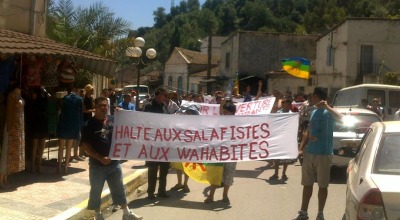Algerians Stage Picnics to Protest Forced Fasting
Around 200 people ate together at a public lunch in the town of Tizi Ouzou on Aug 3 to protest against the “persecution of non-fasters and creeping Islamisation” in the Kabylie region in northern Algeria.
Sandwiches and soft drinks were shared during a picnic held just a short stroll from the headquarters of the local law enforcement agencies, which looked on but did not act.
In Algeria, where Islam is the state religion, breaking the Ramadan fast in public is punishable by fine and imprisonment.
Picnickers circulated a petition, which translates: “The values of tolerance and peaceful co-existence of people of all opinions and faiths that has existed in Kabylie since the dawn of time is being trampled upon. The Algerian government is intruding into private life and persecuting non-fasters.
“We call on the citizens of the world who identify with the values of tolerance and respect to support the initiative of Kabylie by signing the petition for the right to freedom of conscience and tolerance and to guard against any suppression.”
Protesters told World Watch Monitor the picnic was organised as a response to the alleged intimidation of non-fasters on July 19 by police in Tigzrit, 35 km north of Tizi Ouzou.
“We were sitting quietly in a cafeteria, which opens during the day throughout the month of Ramadan,” said one protester, named Malik. “The police came and started taking down the names of people who were in a cafeteria during Ramadan. We don’t understand. We should be free to fast or not to fast.”
Malik said the police asked the café’s owner to report to the police station and confiscated some of his legal documents.
Another picnic was held simultaneously in the town of Aokas in the neighbouring Béjaïa province, which attracted over 100 people.
A number of local Islamic associations expressed their indignation and called on the state to punish those involved.
Meanwhile, the Algerian Minister of Religious Affairs Abu Abdellah Ghoulamallah said the picnics were “provocative and ridiculous”.
“[The protesters] do not represent the Kabylian region, [or] Tizi Ouzou’s residents,” he told Echorouk newspaper. “A total of 800 mosques are built in this province and 1.3 million Muslims are living there. So, 200 people do not represent the region and their act is ridiculous as they want to offend Muslims, but they humiliated themselves instead.”
The state news agency APS reported that the protestors were “not attacking Islam” but asking for “freedom of worship and conscience [which is] guaranteed by the Algerian law”.
However, APS’s claim that the non-fasters included “followers of the evangelistic church who drank beer” was contested and considered by some an attempt to discredit the protestors.
One picnicker, who wished to remain nameless, told World Watch Monitor: “From the first moment to the last, I did not once witness the presence of any evangelist who drinks beer.”
Another told the BBC: “We’re saying to others that this is Kabylie, and here we do what we want. We have to respect our culture, our traditions, our individual and religious freedoms. It doesn’t matter if they’re Jewish, Christian or Muslim.”
In 2010, two Algerian Christians were taken to court for publicly breaking the fast, although they were later acquitted.














































